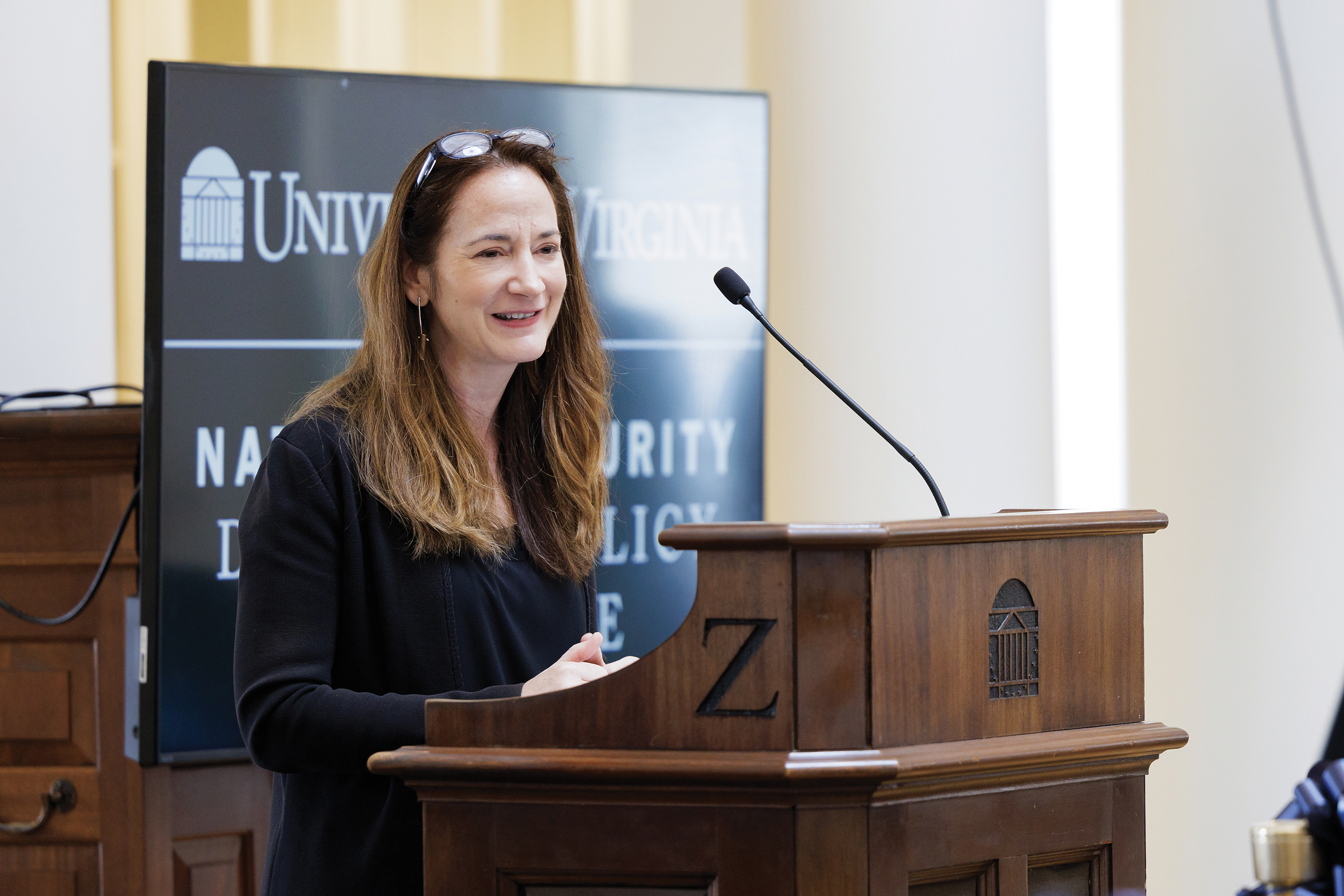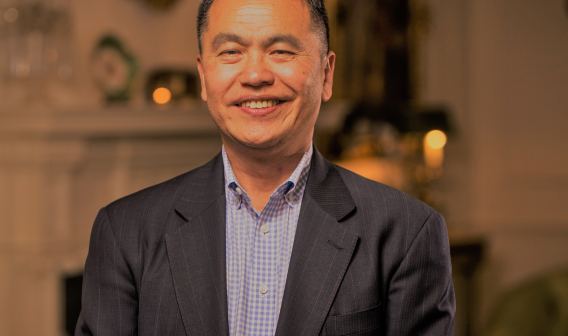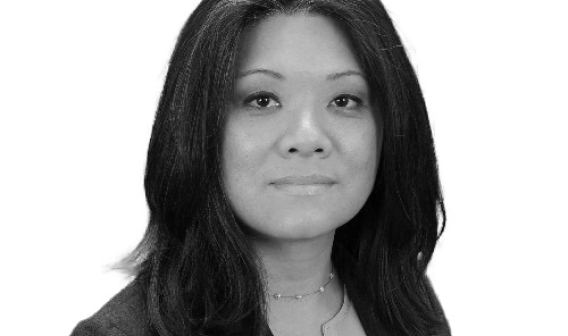Inside Virginia's Federal Research Partnership
Virginia universities provide key cybersecurity research, workforce for the federal government

Old Dominion University’s School of Cybersecurity offers bachelor’s, master’s, and doctoral degrees in cybersecurity and related disciplines.
Recently, an Air Force research agency reached out to George Mason University (GMU) with a pressing issue. Drones were attacking Air Force facilities around the globe. Could GMU’s C5I research hub help the Air Force design a system that would detect the incoming drones and prevent adversarial attacks?
C5I stands for Center of Excellence in Command, Control, Communications, Computing, Cyber, and Intelligence, and director Paulo Costa and his team called upon all of those disciplines as they reached out across GMU’s engineering departments. They brought on board experts in radars, drone security, sensor fusion, and others from diverse engineering and computing departments to weigh in on their areas of expertise.
“We built a team that wrote a proposal, sent it to them, they approved it, and we developed a system that is in use today,” Costa said. “This can only be done if you have a center that is capable of reaching out to the right people, a center that is made by professors itself, who know their colleagues and know who can do what.”
Today, across Virginia, universities are partnering with the federal government and industry to chart new paths for cybersecurity and the deployment of artificial intelligence.
Shaping Cybersecurity Policy at Virginia Tech
“We work with both the intelligence community and the [U.S. Department of Defense], and half of our money flows through industry, so we have this really interesting portfolio,” said Eric Paterson, executive director of the National Security Institute at Virginia Tech.
Founded three years ago as an outgrowth of the university’s Ted and Karyn Hume Center for National Security and Technology, the institute is grounded in the expertise of Virginia Tech’s College of Engineering. It has a payroll of more than 500 people (students included), about $50 million in research expenditures this fiscal year, and more than 250 active projects, Paterson said. About 60% of the institute’s staff and faculty are based in Blacksburg; the rest are at the university’s research center in Arlington.
The projects that come from industry giants like Lockheed Martin or Boeing are funded from their internal R&D money, or “golden money,” Paterson said.
“That’s a really special thing,” said Paterson, who is also the Rolls-Royce Commonwealth Professor of Marine Propulsion in Virginia Tech’s College of Engineering, “because they are choosing to spend it at a university instead of on their own.”
The institute’s mission is twofold: research, and workforce development for the engineering sectors of the cybersecurity and intelligence industries. A thousand students worked with the institute in the past year alone.
“It sounds simple, but there are very few places in the country that do what we do,” Paterson said. “There are hundreds and hundreds of research institutes and labs of many different varieties, but none of them have the chartered mission of doing this workforce development at scale.”
The institute brings faculty together from across the university and pairs them with teams of students to tackle outside research projects, he explained. The projects are often classified, but the majority are focused on devices, machines, and communication research and development.
For instance, “How do you decrypt other people’s communications?” he wondered. “How do you design anything from satellites to drones to undersea vehicles? We want all of these to talk to each other. How do you do that and do it securely? It’s extraordinarily complex.”
The institute has been growing at the rate of 30–40% per year. One goal for the future is to apply its engineering expertise to help government shape policy.
“What we want to do is help the government and all of our industry partners solve hard problems,” Paterson said.
A New Data-Centric Partnership at UVA
Virginia’s newest higher education institute aims to do just that for the federal intelligence community. Last fall, the University of Virginia (UVA) partnered with the U.S. Office of the Director of National Intelligence (ODNI) to establish UVA’s National Security Data and Policy Institute, which is charged with bringing academic insight to government policy and decision making in the realms of artificial intelligence and data usage.
“We’re figuring out how to bridge the gap” between the intelligence community and the academic world, said Philip B.K. Potter, an intelligence expert and professor of politics and public policy, who leads the new institute.
The institute was initially funded with a $20 million grant from ODNI. “Our partners at ODNI are struggling with novel problems and questions,” Potter said. Essentially, he said, they want to know “how can they leverage the rapid pace of technological change and the proliferation of data to gain strategic advantage instead of falling victim to surprise?”
Potter was the founding director of the National Security Policy Center at UVA’s Batten School of Leadership and Public Policy. While the center’s mission focuses on public policy and serving students, the institute is designed to draw expertise from across the university, with an orientation toward research and government-academic coordination.
To start, that means scrutinizing AI and machine learning, biotechnology, and microprocessors, to better understand how U.S. capabilities compare to those of other countries, he said.
“I don’t think we always know what it means to be ahead or behind in technological progress, not to mention how to assess where we are in that competition,” he said. “The institute is charged with finding answers to those questions.”

Then-Director of National Intelligence Avril Haines spoke at the University of Virginia in 2024 at the ribbon-cutting for the National Security Data & Policy Institute, a partnership between UVA & the U.S. Office of the Director of National Intelligence.
Training a Workforce for Tomorrow’s Needs
While Virginia’s centers and institutes partner with government and industry, other higher education programs are more directly focused on educating and training students.
For example, at Old Dominion University, a cybersecurity program that launched a decade ago with 11 students has mushroomed into a School of Cybersecurity with an enrollment of roughly 1,650 undergraduate and graduate students. The program was originally designed as interdisciplinary and has maintained that focus, said Daniel Takabi, the school’s director, a professor of electrical and computer engineering, and the Batten Endowed Chair in Cybersecurity.
“What makes our program unique is we have technical courses, but we also offer courses in other nontechnical aspects of cybersecurity,” he said. For instance, philosophy faculty teach courses on the ethics of cybersecurity. A public policy professor teaches cyber policy, and the school offers courses in cyber law and management. The idea is to open the school’s doors to the widest possible variety of students.
Students can participate in basic research, like a recent project that looks at large language models and their vulnerability to so-called jailbreaking attacks. That’s when an outside actor tries to fool the AI into either providing information it was designed to protect, or acting in harmful ways that it was not designed to do. “We’re trying to come up with defense mechanisms to avoid these kinds of prompts working on the model in the future,” Takabi said.
In Northern Virginia, GMU created the first cybersecurity engineering major in the country, which helps support its bustling C5I center. The major launched with 105 students 10 years ago. A decade later, 800 students are enrolled in what is now a department, and interest continues to increase unabated. Throughout, the focus has remained the same, said Costa, professor and chair of the department: to treat cybersecurity not as an afterthought, but as an integral system in any engineering project, built in from the ground up.
“We are changing the paradigm,” he said, “from, ‘Let’s build a system and, oh, we have to put in cybersecurity, let’s put in some passwords.’ That was too late. You already have a lot of vulnerabilities embedded in its design. You need to have cybersecurity in the very first place.”
‘Pose Your Ideas and Go for Them’
Cybersecurity is the latest spoke in the wheel of C5I, which was founded in 1989 with the then-novel concept of creating a common ground where industry, government, and academia could collaborate to address and solve intelligence challenges. The center’s founder, Dr. Harry Van Trees, had deep roots in all three worlds, including serving as chief scientist for the U.S. Air Force. Van Trees, who died in 2022, believed the best place for common ground was at a university, where “you have that academic freedom to pose your ideas and go for them, something you cannot really do in government or industry,” Costa said.
A quarter century later, GMU now has a cybersecurity department with about 80 master’s students and graduates upwards of 200 undergraduates each year, while the C5I center works with government agencies and industry, drawing on deep wells of expertise to provide road maps for solutions to pressing issues. “We help our professors develop answers to questions ranging from, ‘Is this a problem?’ and ‘What is the problem?’ all the way to, ‘Okay, here’s the proof of concept, it’s working,’” Costa said.
As AI grows increasingly more sophisticated, and cybersecurity becomes both more complex and more critical, Virginia’s universities are poised and ready to help, educating the next generation of workers for these high-tech sectors, while engaging in the research that will power their future.
As Virginia Tech’s Paterson said, “We’re really building the pipeline for service to the country.”




